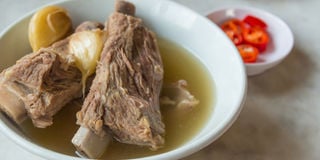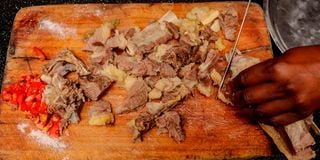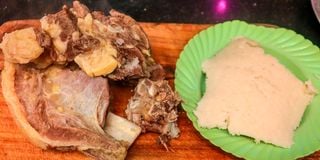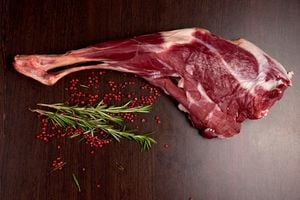
A plate of boiled meat.
Nairobi hoteliers are recording rising sales of boiled meat, commonly referred as boiro, compared to fried and grilled options as Kenyans shift to healthy eating.
A spot check by the BDLife around the Central Business District and environs, areas frequented by middle-class white-collar workers and casual labourers alike, shows that boiled beef represents about 60 percent of the daily meat sales.
Simon Kamau, 46, who operates a restaurant butchery in Ndunyu, Kiambu, is among those who have seen a rise in the number of people asking for boiled beef.

Simon Kamau (left) and Kennedy Waiguru during an interview at their butchery in Ndonyo, Nairobi on November 6, 2024.
“Previously, fried meat was more popular because people said it was tastier. But now, many believe that boiled beef is healthier. They say when they eat it, they don’t experience stomach discomfort afterwards and they feel more energised and lighter,” he said. “On a typical day, I sell about 150 kilos of meat, and of that, 70 kilos is boiled beef. The rest is split between fried meat, which is around 50 kilos, and nyama choma, which makes up about 30 kilos. Customers particularly like chuck on bones.”
Boiled meat which was a delicacy among older generations now cuts across ages. “A majority of my customers are men aged between 25 and 60 years old,” Mr Kamau says.
More expensive
The shift to boiled beef has nothing to do with lower prices. Mr Kamau sells boiled beef at Sh1,200 per kilo, slightly higher than fried meat, which goes for Sh850 per kilo.
“We boil it with bananas or potatoes, purple onions and tomatoes, nothing fancy like herbs or spices or oil,” he adds.

Abednego Mutuku prepares boiled meat at his butchery in Ndonyo, Nairobi on November 6, 2024.
K’Osewe Ranalo Foods, a well-known restaurant in Nairobi, also added boiled beef to its menu in 2023 in response to many customer requests.
Sandra Ogutu, the restaurant's supervisor says boiled beef has quickly become a favourite, particularly among male customers.
“Most of our clients, especially men who drink alcohol, say it helps cure hangovers,” Ms Ogutu says. “They love the rib parts and the oily bits of the beef and always ask for that specific part. We’re now selling about 20 to 30 kilos of boiled beef daily, which is a big jump from the 16 kilos we used to sell when we first introduced it.”
They have also adjusted prices. It now costs Sh850 for a plate of half a kilo of the boiled meat from Sh450. “We had to slightly raise prices because of the increased demand, but the customers don’t mind. They keep ordering,” Ms Ogutu says.
Some restaurants attribute the jump in price to higher costs from the slaughterhouses. According to the 2023 Economic Survey, the price of beef with bones rose from Sh439.04 per kilo in 2018 to Sh514.13 in 2022, an increase of 8.3 percent.
At another butchery-cum-restaurant in Kiambu, Abednego Mutuku, 51, says he sells about 80 kilos of boiled beef daily, and ribs and arm cuts are the most popular choices.
“I record higher sales during the colder season like now," he says.
Hoteliers point to health concerns as the key driver.
“People are more health-conscious these days," Mr Mutuku says.
Risks of overconsumption
But is it healthier? Nutritionists argue it could be but some of the boiled beef has a high saturation of fats.
Joy Ouma, a registered clinical nutritionist at Aga Khan University Hospital, says beef, in general, contains high levels of saturated fat, which can lead to an increase in cholesterol.
“While beef is a good source of protein and iron, the concern arises when it is consumed in excess, particularly when boiling methods lead to overconsumption because of how easy it is to prepare,” she says.
Kepha Nyanumba, a certified Nairobi-based nutritionist and dietitian, adds that people often underestimate the health implications of eating large quantities of red meat, regardless of how it is cooked.

Boiled beef served at Meat Point Butchery in Ndonyo, Nairobi on November 6, 2024.
“Boiled beef may seem like a healthier option compared to fried or roasted, but it still contains considerable amounts of fat, especially in the less lean cuts like brisket or ribs. These fats can accumulate in the body over time and contribute to high cholesterol levels, which increases the risk of cardiovascular diseases,” he says.
Cholesterol and heart health
Ms Ouma warns that regular consumption of fatty beef cuts could raise LDL cholesterol, often referred to as 'bad' cholesterol.
Elevated cholesterol levels increase the risk of heart disease, especially when coupled with a sedentary lifestyle or poor dietary habits.
“Many people assume that boiled beef is healthier simply because it’s not fried, but the fat content remains a concern. Consuming beef too frequently or in large portions can lead to serious long-term health issues,” she says.
Mr Nyanumba adds, “Cholesterol control is about moderation. Just because it’s boiled doesn't mean it's safe to eat in excess. People need to be mindful of portions and the frequency with which they consume red meat.”
Strain on Kidneys
Another overlooked risk is the potential strain beef can place on kidneys, especially for people with pre-existing kidney conditions. Beef is rich in proteins, and consuming high-protein diets in large quantities can strain the kidneys, leading to conditions like kidney stones or even chronic kidney disease (CKD).
“Protein breakdown produces waste products like urea, which the kidneys filter out. When you overeat beef, your kidneys work overtime to clear these toxins, which over time can cause damage, particularly in individuals with already compromised kidney function,” says Ms Ouma.
Mr Nyanumba adds that those with a family history of kidney disease or other underlying conditions should be especially careful.

Boiled beef meat served with ugali at Meat Point Butchery in Ndonyo, Nairobi on November 6, 2024.
“A diet high in red meat can accelerate the decline of kidney function in individuals already at risk. It’s crucial to diversify protein sources to avoid overwhelming the kidneys,” he says.
Portion control
One of the greatest challenges with boiled beef is portion control. Because it is often served with starchy accompaniments like rice, ugali, or potatoes, it's easy to indulge in larger portions without realising the caloric load. The meat’s soft texture, combined with a simple stew, makes it deceptively light, leading to overconsumption.
Nutritionists recommend limiting beef intake to a few times a week and opting for leaner cuts such as sirloin or tenderloin to minimise fat intake.
"Variety is key,” Ms Ouma advises. “Instead of always reaching for beef, try incorporating other protein sources such as beans, lentils, fish, or chicken. These alternatives provide necessary nutrients without the same risks of high cholesterol and kidney strain. At the end of the day, how you cook beef is important, but how much you eat and how frequently is even more crucial.”
Mr Nyanumba emphasises the importance of balance in any diet.
“Boiled beef is not harmful in moderation, but it should not become a daily staple. A heavy reliance on beef not only impacts cholesterol but also leaves out other essential nutrients that you can get from plant-based proteins or lean meats like fish.”









